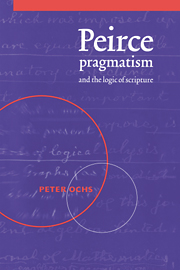Book contents
- Frontmatter
- Contents
- List of abbreviations
- PART I Peirce's pragmatic writing
- 1 Introduction: reading Peirce's pragmatism
- 2 Pragmatic methods of reading and interpretation
- 3 Problems in Peirce's early critique of Cartesianism
- 4 Problems in Peirce's early theory of pragmatism
- 5 Problems in Peirce's normative theory of pragmatism, 1878–1903
- 6 A pragmatic reading of Peirce's lectures on pragmatism
- PART II Peirce's pragmaticist writing
- Notes
- Index
4 - Problems in Peirce's early theory of pragmatism
Published online by Cambridge University Press: 22 October 2009
- Frontmatter
- Contents
- List of abbreviations
- PART I Peirce's pragmatic writing
- 1 Introduction: reading Peirce's pragmatism
- 2 Pragmatic methods of reading and interpretation
- 3 Problems in Peirce's early critique of Cartesianism
- 4 Problems in Peirce's early theory of pragmatism
- 5 Problems in Peirce's normative theory of pragmatism, 1878–1903
- 6 A pragmatic reading of Peirce's lectures on pragmatism
- PART II Peirce's pragmaticist writing
- Notes
- Index
Summary
Pragmatism is a method of exhibiting the relations among language, behavior and experience. In lectures he gave in 1897–8, William James first refers to his philosophy as “pragmatism” and credits Peirce with having first enunciated the concept in the 1870s. Peirce appears to have anticipated the theory of pragmatism in an 1871 review of Frazer's edition of The Works of Berkeley: “A better rule [than Berkeley's] for avoiding the deceits of language is this: Do things fulfil the same function practically? Then let them be signified by the same word. Do they not? Then let them be distinguished.” Peirce's germ of an idea came to life, however, in the discussions of a Metaphysical Club that met in Cambridge in the early 1870s, and it is more accurate to call Peirce and James the primary exponents of pragmatism rather than its authors.
Peirce later reminisces,
The ancestry of pragmatism is respectable enough;… It was in the earliest seventies that a knot of us young men in Old Cambridge, calling ourselves, half-ironically, half-defiantly, “The Metaphysical Club,” – for agnosticism was then riding its high horse, and was frowning superbly upon all metaphysics – used to meet, sometimes in my study, sometimes in that of William James … Nicholas St. John Green was one of the most interested fellows, a skillful lawyer and a learned one, a disciple of Jeremy Bentham. His extraordinary power of disrobing warm and breathing truth of the draperies of long worn formulas, was what attracted attention to him everywhere.
- Type
- Chapter
- Information
- Peirce, Pragmatism, and the Logic of Scripture , pp. 74 - 103Publisher: Cambridge University PressPrint publication year: 1998



